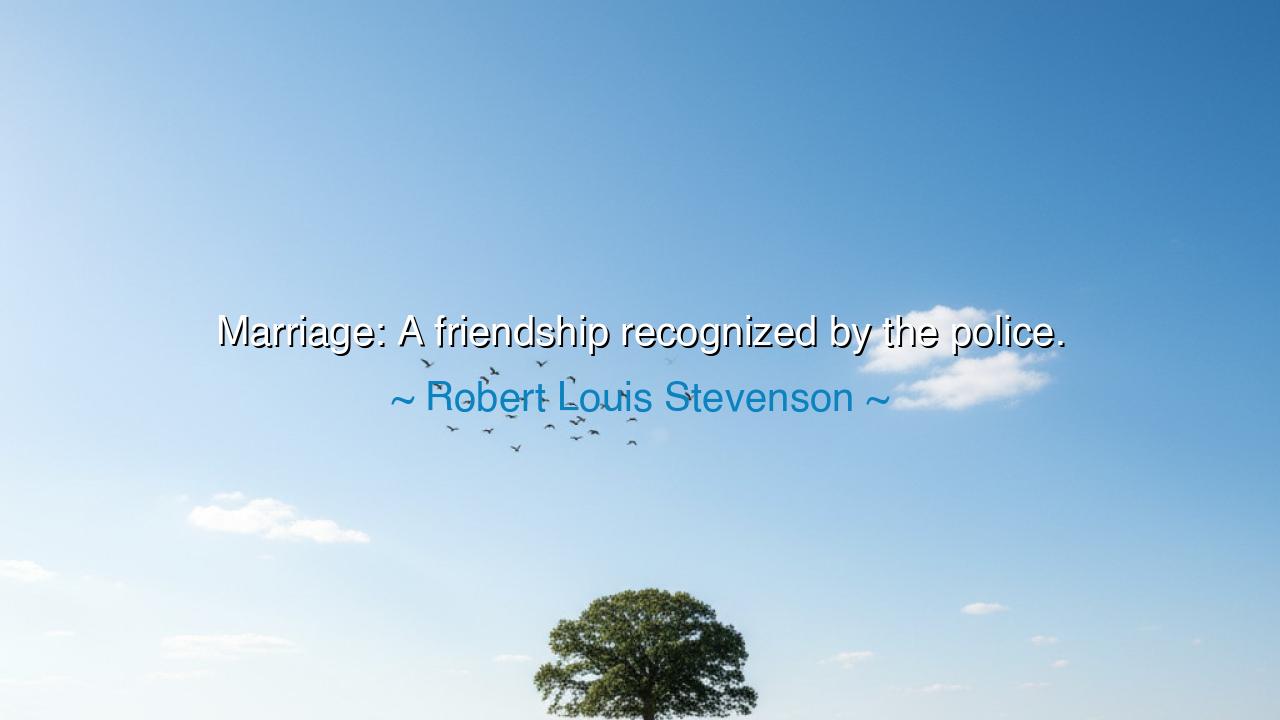
Marriage: A friendship recognized by the police.






In the witty yet profound words of Robert Louis Stevenson, the adventurer, philosopher, and poet of the human heart, we find a truth that dances between humor and wisdom: “Marriage: A friendship recognized by the police.” Though spoken with a smile, this saying carries beneath it the weight of reflection — a contemplation on love, law, and the binding of two souls within the order of society. Stevenson, who spent his life navigating the storms of passion, illness, and exile, knew that marriage is not merely a contract, but a living union where friendship becomes both sanctuary and struggle. In this brief but potent phrase, he reveals the paradox of human love: that what begins as freedom of affection must also find its place within the world’s structures — that what is born in the heart must, in time, answer to the law.
The origin of this quote lies in Stevenson’s character and worldview. He was a man who cherished irony, who could laugh at life’s solemnities while still honoring their meaning. In the late nineteenth century, when marriage was often seen as a rigid social duty, Stevenson dared to speak of it in human terms — as a friendship, not a transaction. Yet his wit adds another layer: by calling it a “friendship recognized by the police,” he reminds us that marriage, though sacred, is also bound by the practical realities of society — by rules, rights, and responsibilities that must be upheld. In this way, Stevenson acknowledges the eternal dance between love’s freedom and civil order.
To call marriage a friendship is to elevate it to its highest and purest form. For friendship, as the ancients knew, is the noblest bond between souls — one founded not on desire or obligation, but on mutual respect and shared virtue. When love ripens into friendship, passion gains wisdom, and companionship becomes sacred. But to call it a friendship “recognized by the police” is to admit that even this sanctity must live under the eyes of the world. Marriage, unlike private friendship, carries the mark of legality; it becomes a social covenant as well as a personal one. It must endure the gaze of society, the trials of time, and the governance of law. Thus, Stevenson speaks both playfully and truthfully — for even the most spiritual union must pay homage to the realm of earth.
Yet beneath his humor lies something tender. Stevenson, whose own marriage to Fanny Osbourne was defiant and passionate, knew that love is never simple. He met Fanny, an American woman separated from her husband, and defied convention to be with her. Their union was forged in courage and tested by hardship, yet it was sustained by deep friendship and mutual devotion. In their wandering life — from France to the South Seas — they shared both illness and adventure, art and poverty. Stevenson’s jest about marriage being “recognized by the police” perhaps carries a memory of their own struggles against authority, of love’s rebellion finding peace only when the world finally acknowledged it. For him, love had to be both wild and lawful, both personal and public — the flame of two hearts tempered by the structure of commitment.
The ancients might have understood this balance well. The philosopher Aristotle once said that friendship is “a single soul dwelling in two bodies.” Marriage, then, is that friendship made visible — a public acknowledgment of two souls choosing to walk one path. The “police,” in Stevenson’s phrase, represent not merely law but the whole fabric of civilization — the witnesses, the customs, the shared order that binds humanity together. Without this recognition, love may burn brightly but briefly, lacking the roots that allow it to endure. Just as a tree must be planted in soil to grow, so love must be planted in the world — given form, boundaries, and commitment — to survive the winds of time.
Stevenson’s wit also hides a warning: that marriage, like friendship, cannot depend solely on the law to sustain it. The “police” may recognize it, but they cannot nurture it. The state may bind two people in union, but it cannot keep them kind, nor make them true. Only the spirit of friendship — the daily acts of forgiveness, laughter, patience, and shared purpose — can preserve the sweetness of the bond. Many marriages perish not for lack of legality, but for lack of companionship. Thus, Stevenson reminds us that while the world may sanction marriage, only love can sanctify it.
So, my child, learn from Robert Louis Stevenson’s playful wisdom. Do not scorn the law that binds, but do not worship it either. Remember that marriage is first and foremost a friendship — a covenant not only before men but before your own soul. If you are to marry, let it be to one who is your equal in spirit — one who delights in your joy, endures your faults, and shares your dreams. Do not measure your love by its ceremonies, but by its constancy. For the law can make you spouses, but only friendship can make you companions.
And thus, Stevenson’s jest becomes a timeless truth: marriage is indeed “a friendship recognized by the police” — a union that must dwell both in heaven and on earth. It is love translated into order, passion bound by promise, freedom intertwined with duty. To live it rightly is to walk the noble path between laughter and reverence — to honor both the heart’s wildness and the world’s wisdom. And when you do, your marriage will not merely be recognized by the police, but by the universe itself, as a union of souls both free and faithful.






AAdministratorAdministrator
Welcome, honored guests. Please leave a comment, we will respond soon